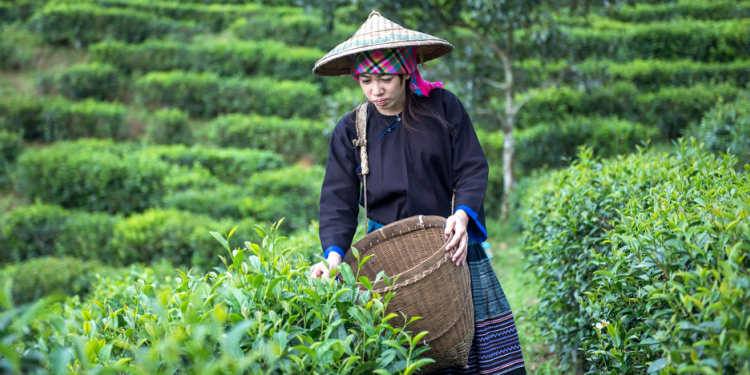Have you ever wondered what goes into making a delicious cup of Thai tea? Well, you’re in for a treat! In this article, we will take you on a journey through the rich and vibrant Thai tea culture. From the traditional brewing methods to the various flavors and ingredients used, you’ll discover the secrets behind this beloved beverage. So sit back, relax, and get ready to delve into the world of Thai tea!
When it comes to Thai tea, there is so much more than meets the eye. At first glance, you may think it’s just a regular cup of tea, but it’s so much more than that. The brewing process itself is an art form, with different regions of Thailand having their own unique techniques and traditions. You’ll learn about the special tools and equipment used, as well as the importance of the tea leaves and sweeteners in creating that distinct Thai tea flavor.
But it’s not just about the brewing process – the flavors and ingredients also play a crucial role in Thai tea culture. From the classic Thai iced tea with its bold and creamy taste to the aromatic Thai herbal teas made from a variety of Thai herbs, there is something for every tea enthusiast. We’ll give you a sneak peek into the different types of Thai tea you can try and the best places to get them, whether it’s from a local street vendor or a trendy tea shop.
So, if you’re ready to embark on a journey through the rich Thai tea culture, make sure to stay tuned for the rest of this article. You’ll gain a deeper understanding and appreciation for this beloved beverage and perhaps even discover your new favorite Thai tea flavor. Cheers to exploring the world of Thai tea!
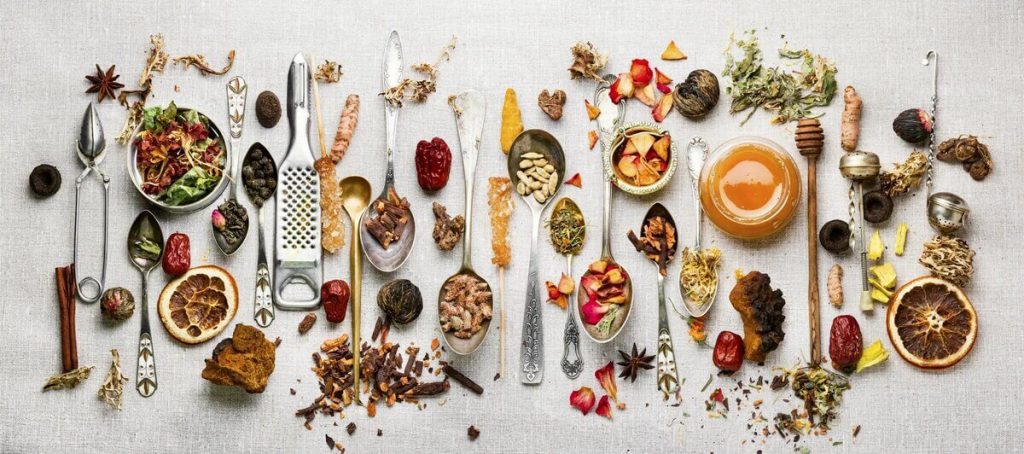
History of Thai Tea
Origins of Thai Tea
Thai tea has a long and rich history that dates back centuries. The origins of Thai tea can be traced back to China, where tea was first cultivated. It was during the 17th century that tea farming techniques were introduced to Thailand by Chinese immigrants. These immigrants settled in the northern regions of Thailand and brought with them their expertise in tea cultivation.
Influence of Chinese Tea on Thai Tea Culture
The influence of Chinese tea on Thai tea culture cannot be overstated. The Chinese immigrants not only brought their tea farming knowledge but also their tea drinking traditions. Thai tea culture is deeply rooted in Chinese tea customs, with many aspects of Chinese tea ceremonies being incorporated into Thai tea rituals.
Evolution of Thai Tea Techniques
Over the years, Thai tea techniques have evolved and adapted to the local climate and taste preferences. Thai tea farmers have developed their unique methods of processing and brewing tea. These techniques involve drying the tea leaves under the sun and using different methods of fermentation and roasting. The result is a distinctively flavorful and aromatic Thai tea.
Symbolism in Thai Tea Culture
Meaning of Different Tea Colors
In Thai tea culture, different tea colors are associated with various meanings. Green tea, for example, symbolizes fertility and prosperity. Black tea is often considered a sign of strength and resilience. Oolong tea represents balance and harmony, while herbal infusions are believed to have healing properties.
Tea Ceremonies and Rituals
Tea ceremonies and rituals have deep cultural significance in Thai tea culture. These ceremonies are often performed to show respect to elders and to welcome guests. The tea is carefully brewed and served in traditional teaware, and each step of the ceremony is performed with precision and grace.
Thai Tea as a Symbol of Hospitality
Thai tea is considered a symbol of hospitality and is often offered to guests as a gesture of welcome. It is customary for Thai households to serve tea to visitors, and the act of serving tea is seen as a way to establish a connection and nurture relationships.
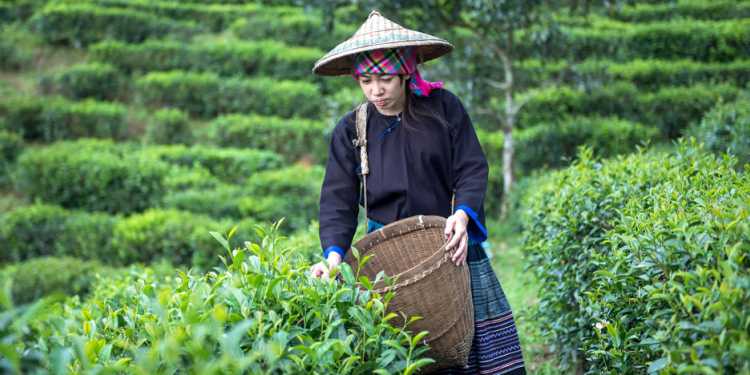
Traditional Thai Tea Recipes
Thai Iced Tea
Thai iced tea, also known as “cha yen,” is a popular and refreshing beverage in Thailand. It is made by brewing strong black tea with spices such as star anise, cardamom, and cinnamon. The tea is then sweetened with condensed milk and served over ice. The result is a creamy, sweet, and aromatic drink that is perfect for hot summer days.
Cha Yen (Thai Milk Tea)
Cha yen, or Thai milk tea, is another beloved Thai tea recipe. It is made by steeping black tea in hot water and then adding condensed milk and sugar. The tea is then poured over ice, creating a creamy and indulgent treat. Cha yen is often served as a dessert or enjoyed alongside spicy and savory Thai dishes.
Nam Chai (Thai Herbal Tea)
Nam chai, or Thai herbal tea, is a caffeine-free alternative made from a blend of Thai herbs and spices. It is believed to have medicinal properties and is often consumed for its health benefits. Nam chai is brewed by boiling the herbs and spices in water and then sweetened with honey or sugar. It can be enjoyed hot or cold, depending on personal preference.
Tea Varieties in Thailand
Green Tea
Green tea is one of the most widely consumed tea varieties in Thailand. It is known for its fresh and grassy flavor and is rich in antioxidants. Green tea is often enjoyed plain or with a squeeze of fresh lime juice for added tanginess.
Black Tea
Black tea is another popular tea variety in Thailand. It has a robust and full-bodied flavor and is often enjoyed with milk and sugar. Black tea is also commonly used in Thai iced tea recipes.
Oolong Tea
Oolong tea is a semi-fermented tea that falls somewhere between green and black tea in terms of flavor and color. It has a floral and fruity taste and is often enjoyed without any additives to fully appreciate its complex flavors.
Herbal Infusions
Thai herbal infusions are made from a variety of herbs and spices, including lemongrass, ginger, and pandan leaves. These herbal infusions are caffeine-free and are believed to have various health benefits, such as aiding digestion and boosting the immune system.
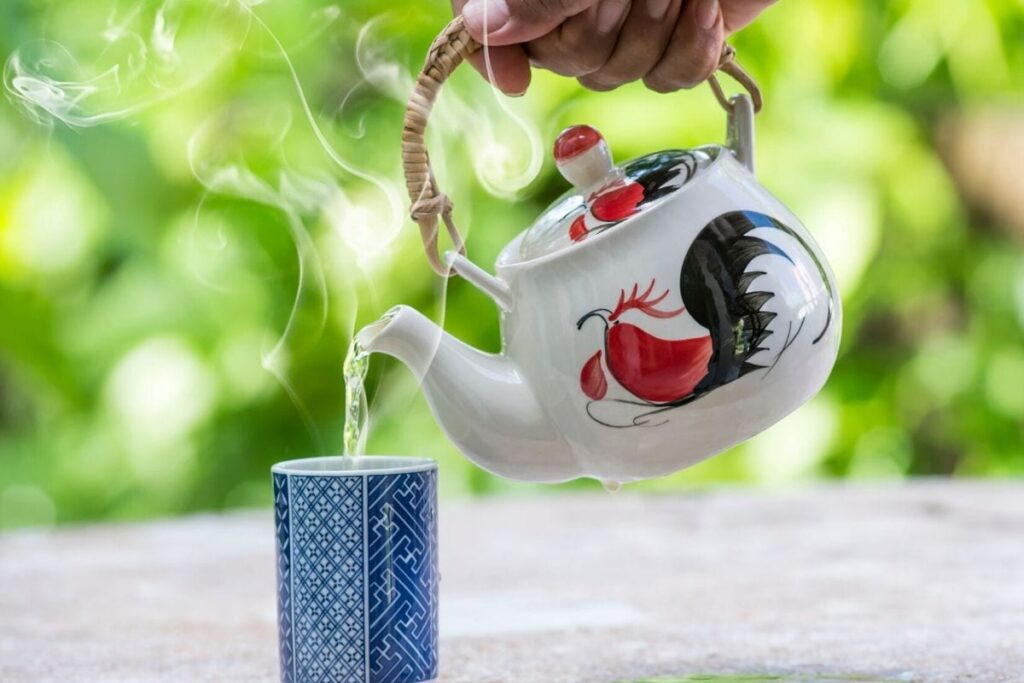
Tea Plantations and Harvesting Methods
Prominent Tea Growing Regions in Thailand
Thailand is home to several tea-growing regions, each known for producing tea with distinctive flavors. The northern regions of Chiang Mai and Chiang Rai are known for their high-altitude tea plantations, which produce light and delicate teas. The Doi Mae Salong region is renowned for its oolong teas, while the southern region of Pattani is known for its robust black teas.
Traditional Methods of Tea Leaf Harvesting
Traditionally, tea leaves were harvested by hand-picking the youngest and most tender leaves. This delicate process required skilled tea pickers who knew how to select the best leaves without damaging the tea bushes. Hand-picked leaves are often considered higher in quality and are preferred by tea connoisseurs.
Modern Techniques in Tea Plantations
In recent years, modern techniques such as machine harvesting have been adopted in some tea plantations to increase efficiency and productivity. However, traditional methods of hand-picking are still widely practiced, particularly in smaller tea estates that prioritize quality over quantity.
Art of Tea Brewing
Tea Brewing Equipment
In Thai tea culture, specific teaware is used for brewing and serving tea. This includes clay teapots, ceramic tea cups, and ornate tea trays. These teaware are not only functional but also works of art, with intricate designs and vibrant colors that enhance the tea-drinking experience.
Brewing Techniques
Thai tea brewing techniques vary depending on the type of tea being brewed. Generally, loose tea leaves are steeped in hot water for a specific amount of time to ensure the perfect infusion. The water temperature and steeping time are carefully controlled to bring out the best flavors and aromas of the tea.
Factors Affecting Tea Flavor
Several factors can affect the flavor and quality of Thai tea. These include the variety of tea leaves, the altitude at which they are grown, the soil conditions, and the climate. The skill and expertise of tea farmers and the brewing techniques also play a significant role in the overall taste of the tea.
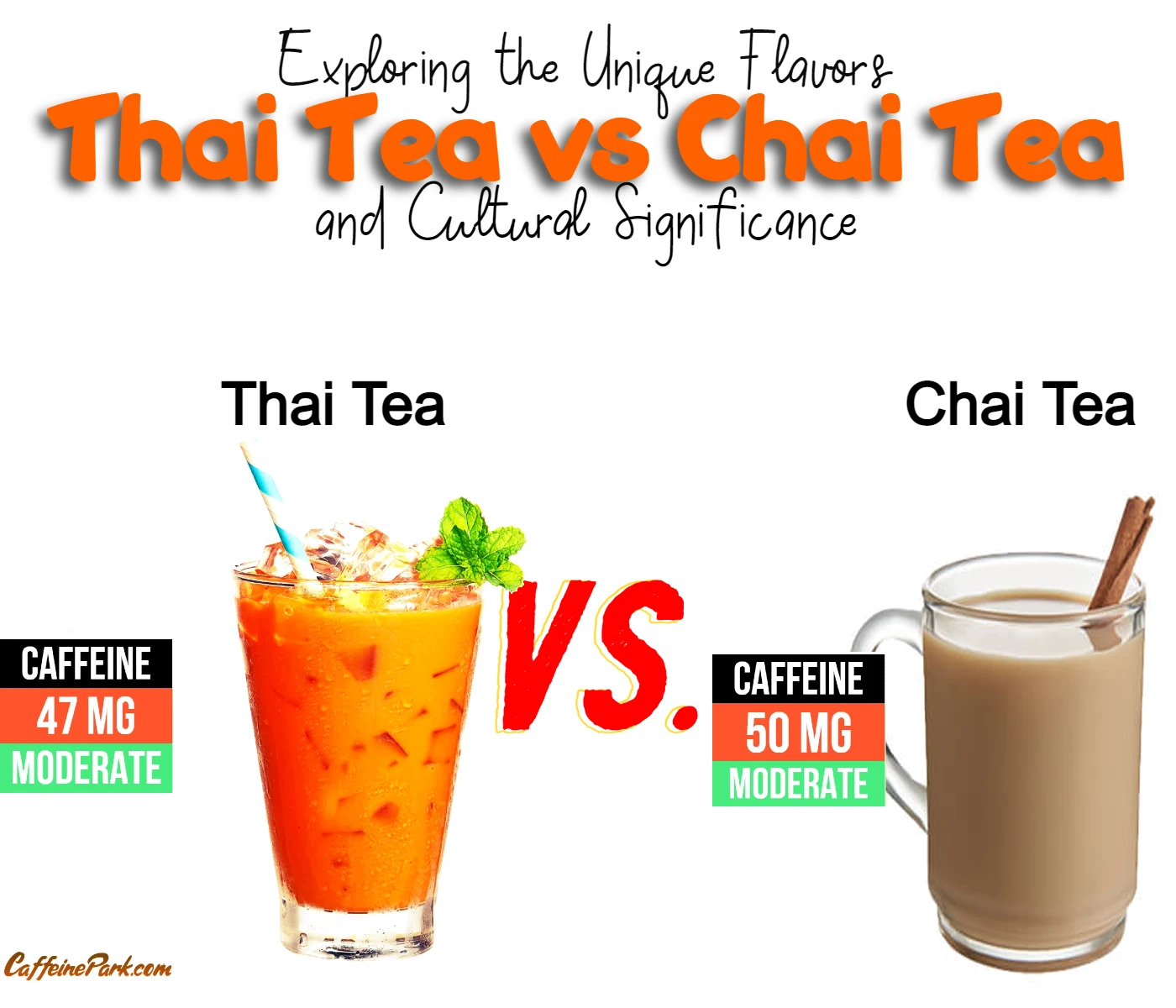
Tea Culture and Social Gatherings
Tea Houses and Cafés in Thailand
Tea houses and cafés in Thailand play a vital role in promoting tea culture and providing spaces for tea enthusiasts to gather and socialize. These establishments offer a wide variety of teas, ranging from traditional Thai teas to specialty teas from around the world. They often host tea tasting events and tea workshops to educate and engage tea lovers.
Tea as a Social Bonding Tool
In Thai culture, tea is seen as a social bonding tool. It is often enjoyed in the company of others, whether it be family, friends, or colleagues. Sharing a cup of tea encourages conversations and fosters connections among people, making tea a significant part of social gatherings and celebrations.
Tea in Traditional Thai Festivals and Ceremonies
Thai festivals and ceremonies are steeped in tradition and often incorporate tea as an essential element. For example, during the Thai New Year, known as Songkran, it is customary to offer tea to monks as a sign of respect and to seek blessings. Tea is also served during weddings, funerals, and other important milestones as a way to honor and commemorate the occasion.
Health Benefits of Thai Tea
Antioxidant Properties
Like other types of tea, Thai tea is rich in antioxidants, which help protect the body against free radicals and reduce the risk of chronic diseases. Antioxidants also have anti-inflammatory properties and may promote healthy aging.
Improvement of Digestive Health
Thai herbal teas, in particular, are known for their digestive properties. Herbs such as lemongrass and ginger are used in traditional Thai teas to soothe an upset stomach, ease bloating, and aid digestion.
Boosting Immune System
Many Thai herbal teas are believed to have immune-boosting properties. Herbal ingredients such as turmeric, ginger, and holy basil are known for their anti-inflammatory and antimicrobial properties, which may help strengthen the immune system and fight off infections.
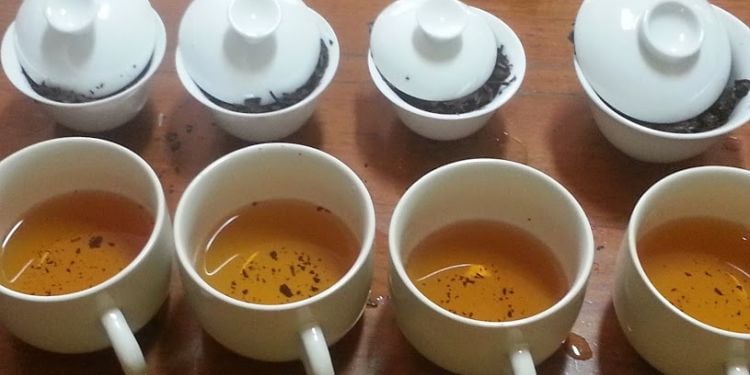
Thai Tea in Modern Society
Influence of Thai Tea in Global Culinary Trends
Thai tea has gained popularity worldwide and has made its way into global culinary trends. Thai iced tea, in particular, has become a favorite among tea enthusiasts and is often found in trendy cafes and restaurants. Its unique combination of flavors and vibrant appearance have made it a staple in the culinary world.
Thai Tea Brands and Global Marketing
With the growing demand for Thai tea, several Thai tea brands have emerged and gained recognition on the global stage. These brands have successfully marketed and exported Thai tea products, bringing the rich flavors of Thai tea to tea lovers around the world.
Thai Tea Innovations and Fusion Recipes
Thai tea has also inspired innovative fusion recipes that blend traditional Thai flavors with other cuisines. From Thai tea-infused desserts to Thai tea-flavored cocktails, these recipes showcase the versatility of Thai tea and its ability to complement a wide range of flavors.
Conclusion
Thai tea culture is a fascinating and vibrant world that offers a glimpse into the rich history and traditions of Thailand. From its Chinese origins to its unique brewing techniques and symbolic meanings, Thai tea has woven itself into the fabric of Thai society. As Thai tea continues to evolve and gain global recognition, it is important to preserve and further promote the heritage and traditions that make Thai tea culture so special. Whether you’re sipping a cup of Thai iced tea or attending a traditional tea ceremony, the experience is sure to be both enlightening and delicious. So, immerse yourself in the rich Thai tea culture and discover the wonderful world of Thai tea for yourself.
